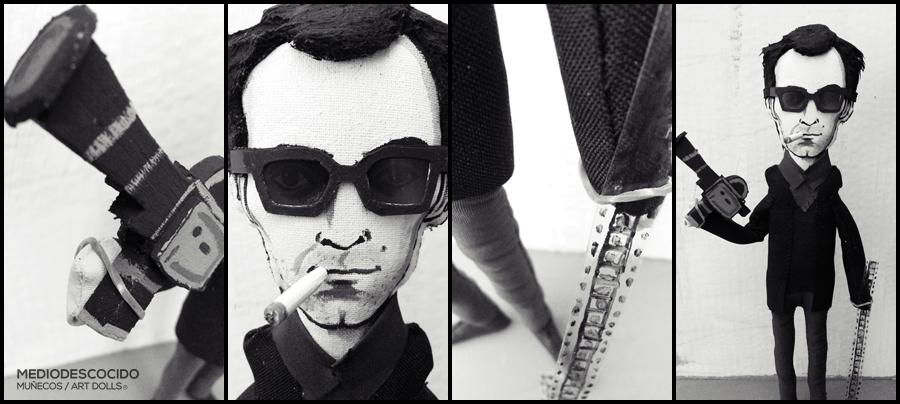In the ever-evolving landscape of cinema, few names resonate as profoundly as Jean-Luc Godard. As a pioneering force of the French New Wave, Godard redefined the language of film, infusing it with a bold sense of innovation and intellectual rigor. His signature style—characterized by unconventional narratives, playful jump cuts, and philosophical musings—challenged traditional storytelling and inspired generations of filmmakers. This article delves into the unique elements that define Godard’s cinematic vision, celebrating a legacy that continues to shape and invigorate the world of film with its audacious creativity and enduring influence.
Innovative Narrative Techniques and Their Impact on Modern Filmmaking
Jean-Luc Godard, a visionary in the realm of cinema, revolutionized storytelling through his innovative narrative techniques that continue to influence modern filmmaking. By breaking conventional storytelling norms, Godard introduced a new wave of cinematic language that embraced the unexpected. His unique approach can be seen in techniques such as jump cuts, which disrupt the continuity to create a more dynamic narrative flow, and direct address, where characters speak directly to the audience, blurring the line between fiction and reality.
- Jump Cuts: By fragmenting scenes, Godard challenged the linear progression, encouraging viewers to engage more actively with the story.
- Non-linear Storytelling: His narratives often eschew traditional structure, allowing for a more flexible and immersive experience.
- Meta-commentary: Films like “Breathless” include self-referential elements that invite audiences to reflect on the nature of cinema itself.
These techniques have paved the way for a more experimental and introspective form of filmmaking, inspiring directors to explore new dimensions of storytelling. Godard’s legacy is a testament to the power of innovation in art, continually pushing the boundaries of what cinema can achieve.

The Art of Visual Storytelling: Godard’s Unique Cinematic Language
Jean-Luc Godard revolutionized the way stories are told on screen by embracing a bold and fragmented narrative style. His films often break the fourth wall, directly engaging the audience and challenging traditional storytelling norms. Through unconventional editing techniques, such as jump cuts and disjointed sequences, Godard created a visual language that was both disruptive and poetic. His approach encourages viewers to actively participate in the narrative, interpreting the film’s meaning through its visual cues and stylistic choices.
Godard’s use of color, sound, and composition further enhanced his unique cinematic language. He often employed vibrant color palettes to evoke emotion and used sound as a narrative tool, integrating music and dialogue in unexpected ways. Some of his distinctive techniques include:
- Jump Cuts: Creating a sense of urgency and spontaneity.
- Nonlinear Narratives: Encouraging audience interpretation and engagement.
- Breaking the Fourth Wall: Establishing a direct dialogue with viewers.
- Innovative Sound Design: Using sound to build atmosphere and convey emotion.
Godard’s mastery of visual storytelling not only transformed cinema but also empowered future filmmakers to explore and redefine the boundaries of film narrative.
Embracing the Avant-Garde: How Godard Redefined Genre Conventions
Jean-Luc Godard’s audacious approach to filmmaking challenged and expanded the boundaries of traditional genres. By incorporating a blend of narrative experimentation and stylistic innovation, he transformed the cinematic landscape. His films often subverted conventional storytelling, replacing linear plots with fragmented narratives that demanded active engagement from the audience. Godard’s use of jump cuts, a technique that disrupts continuity, became a hallmark of his work, imbuing his films with a dynamic energy that resonated with a new generation of filmmakers.
- Genre Blending: Godard seamlessly fused elements from different genres, creating films that defied easy categorization.
- Breaking the Fourth Wall: Characters frequently addressed the audience directly, blurring the line between fiction and reality.
- Intertextuality: His work was rich with references to literature, art, and cinema, inviting viewers to explore deeper meanings.
Through these techniques, Godard not only redefined genre conventions but also paved the way for future directors to explore uncharted creative territories. His legacy is a testament to the power of innovation in storytelling.

Inspiring Future Generations: Lessons from Godard’s Creative Vision
Jean-Luc Godard’s innovative approach to filmmaking continues to serve as a beacon for aspiring creators. His ability to break conventional norms while embracing the essence of storytelling provides a blueprint for those daring enough to explore the uncharted territories of cinematic expression. Godard’s work teaches us the value of risk-taking and artistic authenticity, urging future filmmakers to trust their instincts and redefine the boundaries of their craft.
- Embrace Experimentation: Godard’s films encourage a willingness to try new techniques and narratives.
- Prioritize Authenticity: Staying true to one’s vision can lead to groundbreaking work.
- Challenge the Norms: Questioning established conventions can lead to innovation.
Through his creative vision, Godard has empowered generations to find their voice and contribute uniquely to the world of cinema, ensuring his legacy as a catalyst for continuous evolution and inspiration in filmmaking.































